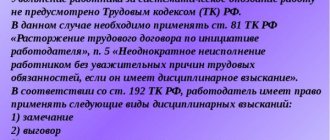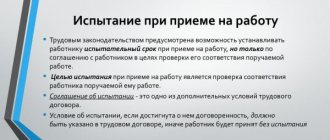Legal status of lunch breaks
The lunch period does not count towards working time and, as a result, is not paid.
The need to introduce a lunch break on a daily basis is established by Art. 100 Labor Code of the Russian Federation. Its provisions regulate the distribution of working hours and rest periods. At the same time, the Labor Code of the Russian Federation stipulates the total duration of the working week, acceptable norms for the duration of shifts and options for ensuring personnel rest.
The procedure for providing a lunch break under the Labor Code of the Russian Federation is regulated by several articles:
| Article of the Labor Code of the Russian Federation | Content |
| Art. 107 | Lunch time is attributed to the period of release of officials from performing labor functions |
| Art. 108 | Time allocated for meals is allocated from the work schedule. Therefore, the answer to the question of whether lunch is included in working hours is always negative. |
Lunch time is a period of short rest. At these moments, the employer cannot force the employee to engage in his main work activity. The application of sanctions by management to an employee for behavior contrary to labor regulations and corporate ethics is possible only during working hours.
The distinction between periods of work and non-work plays a role in determining the duration of absence from work. As a general rule, an employee can be fired for leaving the workplace for more than 4 hours. But if this period includes lunch time, and the actual absence is less than 4 working hours, termination of the employment contract is unlawful (JSC Sverdlovsk Regional Court dated March 13, 2018 No. 33-4752/2018).
The position of legislators on the issue of whether a lunch break is included in working hours is clear:
- absence from the workplace during the hours allocated for meals cannot be regarded as absenteeism;
- Officials cannot be held accountable if they refuse to resolve production issues during lunch time.
The only exception, when lunch is included in working hours, is made in relation to persons whose specific work requires their constant presence at the workplace throughout the entire shift.
In this case, the employer is obliged to provide the employee with the opportunity to eat food on the territory of the enterprise. Lunch will be carried out without actual interruption from work functions, so it is counted towards the total duration of the working day. In the PVTR, the employer has the right to provide for types of work that cannot be interrupted.
Types of breaks during the working day
Art. Article 37 of the Constitution regulates the right of every person to rest. The application of the norm is ensured by limiting the duration of the work function, as well as by providing rest for various purposes during the day. It is worth noting that in addition, every citizen has the right to receive annual leave paid by management, weekends and holidays.
Art. 106 of the Labor Code of the Russian Federation provides that rest is a certain length of time during which an employee is released from fulfilling obligations regulated by an employment contract (concluded upon acceptance to a position). He uses this time as he wishes.
Types of recreation provided for by the Labor Code of the Russian Federation:
- breaks planned during a shift or work day;
- daily rest hours (in legislation it is called inter-shift);
- weekends (officially it is Sunday, most employers additionally assign one more day);
- holidays, while employees are exempt from performing their work functions;
- vacation.
Breaks during a work shift include those intended for feeding a child under 1.5 years of age. They have the following features:
- organized every 3 hours;
- by agreement between the employee and the employer, they can be postponed to the morning before work or the evening after it.
- constitute working hours and are therefore paid by the employer;
- Duration is at least half an hour per child.
The legislative aspect of providing breaks for feeding purposes is Art. 264 Labor Code of the Russian Federation.
How long does it take for lunch?
So, a lunch break is a type of rest time, when an employee is freed from work duties and does what he sees fit. The duration of the break for rest and food is from 30 minutes to 2 hours (Article 108 of the Labor Code of the Russian Federation).
In this case, the specific duration:
Lunch time is provided neither at the beginning nor at the end of the working day (shift).
Determining the time frame for the duration of a lunch break is possible in two ways:
- the employer brings up the issue of determining the time range for lunch for discussion with the workforce;
- The head of the company independently decides how long lunch will last at the enterprise.
A uniform standard for lunch hours for all employees is enshrined in the PVTR. If one or more employees, for objective reasons, are not satisfied with the option proposed by the employer, the lunch time will be postponed by agreement of the parties. A lunch break, agreed upon individually, must be supported by the provisions of the employment contract or an additional agreement to it.
What does an employee have the right to do during his lunch break?
Lunch break is personal time
The lunch break is the personal time of each employee, so he has every right to do whatever he wants. For example, go to a cafe, to the clinic, shopping, read, sleep. It is important to know that the employer does not have the right to prohibit leaving the workplace during lunch. The main thing is that the employee manages to meet the break time frame.
There are enterprises where employees are forced to have lunch at their workplaces. In this case, the employer is obliged to provide all conditions so that the employee can eat in peace and rest for the time allotted to him. For example, some organizations have designated areas for eating. Other organizations have their own canteens, where chefs cook for the entire team. This often happens in catering establishments, as well as in places where the territorial distance does not allow going to dine somewhere else.
An employee can do his immediate work during lunch. There are a number of nuances here. If the employee does this on his own initiative, the work will not be paid. If at the initiative of the employer, then the work must be paid. In the second case, the employee’s written consent is required. Almost all categories of citizens can be involved in overtime work, except for pregnant women and minors, as well as those who have not given their written consent.
If desired, the employee can even work at a second job during the break. If this, of course, does not interfere with work at the main place and does not contradict the employment contract concluded with the employer. In some cases, specified in the contract, agreement with the manager on the possibility of working in one more place is required.
So, an employee can do whatever he wants during his lunch break, and this right is protected by Russian law.
Does an employee have the right to leave the employer’s premises at lunchtime?
The Labor Code of the Russian Federation does not contain rules requiring an employee to remain on the employer’s premises during the lunch break. The principle of “disposing of your rest time at your own discretion” presupposes the ability to leave the workplace. Compliance with this principle gives management the right not to include a break during working hours, otherwise it will be paid.
The conclusion was made by the Supreme Court of the Republic of Khakassia in the Determination dated June 19, 2018 in case No. 33-1445/2018, the essence of which is as follows:
The court accepted the employee’s position: the peculiarities of the operation of a 24-hour gas station did not give him a real opportunity to fully use lunch breaks and leave the workplace. Therefore, rest time must be classified as working time and paid for.
If an employee spends lunch time on the employer’s premises, he is obliged to comply with local local regulations: for example, labor protection requirements, discipline, etc. (Article 21 of the Labor Code of the Russian Federation).
List of works requiring catering during working hours
The list of jobs that require catering during working hours is established by the internal regulations of organizations. An example is office enterprises, where work cannot be interrupted for a long period of time. In this case, meals are organized on site - the employee, without ceasing to fulfill his obligations, eats food.
In this case, the time spent on meals in accordance with the Labor Code of the Russian Federation is included in the working duration, therefore, subject to payment.
An indication that the position does not imply the exclusion of meal breaks from working hours must be contained in the employment contract when accepting the employee. What other work requires on-site catering in accordance with the Labor Code of the Russian Federation? Another example is the performance of functions by an operator, dispatcher, or reception staff. Working conditions do not allow them to leave the workplace and abandon their work obligations.
Author of the article
Lunch break for part-time and part-time work
The legislation provides for the possibility of working part-time (Article 93 of the Labor Code of the Russian Federation). To avoid violation of employee rights, the employer must:
- stipulate meal times for this category of personnel;
- do not set the duration of the lunch break for a 4-hour working day to less than half an hour.
If daily work (shift) does not exceed 4 hours, the employer has the right not to provide a break:
- if it is specified in the PVTR;
- if the condition is provided for in the employment agreement.
This situation is possible with part-time work or with the establishment of a part-time working regime.
Special cases
In conclusion, we will consider several situations where the time and duration of a lunch break is regulated by special rules.
Lunch break for a 4-hour working day
If an employee’s working day lasts no more than 4 hours, the employer has the right not to provide a break for rest and meals. But his absence should be recorded officially - in the internal regulations or in the employment contract.
The same rule applies to part-time workers if they take a “second” job after the main one, that is, for no more than 4 hours (Article 284 of the Labor Code). But if they work more than 4 hours (on days when they do not need to go to their main job), they should have a lunch break.
Lunch time during a 12-hour workday
With a 12-hour working day (and longer shifts), breaks for lunch and rest cannot exceed 2 hours. It can be divided into parts, but in total they should be 120 minutes.
The rest time for shift workers is regulated by Art. 301. TK. The beginning and end, as well as the number of lunch breaks, are established by a special shift work schedule, which is approved by the employer.
"Floating" lunch break
Sometimes it applies to all employees, sometimes it is provided for specific employees - at their request and the goodwill of management. Then an additional agreement to the employment contract is drawn up, which specifies the duration of the lunch break, but does not determine the exact time of its start and end.
If a “floating” lunch is established for all employees (or those working in certain positions), this is indicated in the Internal Rules or in the order to amend them. For example, a “floating” lunch is used during irregular working hours.
Lunch break in a 12-hour workday
During an extended work shift, labor law does not provide for the employer's obligation to introduce additional lunch breaks. The manager can reserve one lunch for staff working longer than 8 hours in a row or provide several breaks for meals. If the work shift lasts 12 hours, it is recommended to divide lunch time into 2 intervals, for example, 45 minutes each.
If you have any unresolved questions, you can find answers to them in ConsultantPlus.
Full and free access to the system for 2 days.
When organizing an intra-shift rest schedule with several lunch intervals, it is necessary to take into account that:
- each such break cannot be less than 30 minutes;
- the total duration of time allotted by the employer for meals should not exceed 2 hours per daily shift.
Personal needs
During working hours, an employee may have needs to satisfy personal needs:
- going to the toilet;
- taking medications prescribed by a doctor;
- performing hygiene procedures;
- smoking (for smoking employees), etc.
Labor legislation does not regulate this area directly, but one of the basic principles of labor law in accordance with Art. 2 of the Labor Code is the obligation to provide fair working conditions, which presupposes:
- safe working conditions;
- compliance with occupational hygiene and workers;
- workers' rest.
Consequently, a break from work to satisfy natural personal needs is an inalienable right of an employee, based on the basic principles of labor law. The situation is different with smoking breaks during working hours according to the Labor Code: they are not mandatory, which means they are given only at the personal discretion of the organization’s management.
The intervals of such pauses are difficult to regulate (with the exception of smoking breaks), but they must be specified in the labor regulations or the employee’s employment contract.
Changing the duration of the lunch break
The duration of the lunch break varies within acceptable limits:
- For all employees (management initiative): an order is issued to change the PVTR, familiarization is carried out 2 months before the changes enter into force (Article 74 of the Labor Code of the Russian Federation). If necessary, the terms of employment contracts are adjusted.
- On an individual basis: the employee’s application is accepted, an administrative document is issued, and an additional agreement is concluded.
According to a similar scheme, the employer has the right to set a variable lunch time. Let's talk about it in more detail in a separate article.
How to control your lunch break time
Employers keep time sheets. The report card indicates whether the person came to work and how many hours he worked. Time sheets are maintained by personnel department employees or field managers. At the end of the month, wages are calculated based on the timesheets depending on the number of hours worked.
There is a more modern way to track how much time an employee spent at lunch - electronic keys. When entering and leaving, an electronic chip records the exact time. Therefore, with the help of modern technologies, it is easy and simple to identify unruly employees.
How are lunch times controlled?
But there is also a disadvantage to electronic keys. In an individual case, there may be a good reason why the employee was late from lunch. You can explain this to your colleague, but hardly to a soulless electronic device.
Thus, employers always control the lunch break; the only difference is in the methods of control and vigilance. What other work breaks exist besides lunch breaks?
The lunch break is not paid by the employer. But there are breaks that the employer is obliged not only to provide to employees, but also to pay for them:
- Warm up break. This rule applies to those who are at sub-zero temperatures outdoors or in an unheated room. An employee has the right to smoke and drink tea during a break, and this time will be paid for by the employer.
- Take a break while working at the computer. When constantly working at a computer, an employee has the right to be distracted for 15 minutes. The computer's eyes get tired, and the employee needs to give them a rest. This break is also paid, regardless of what exactly the employee was doing at that time.
- Break for feeding the baby. At the request of a woman who is the mother of a child under one and a half years old, breaks of at least 30 minutes every 3 hours are provided to feed the child. This break may be longer, depending on the number of children in the family. Labor protection for women with children is under the control of government agencies, so employers try not to violate the rights of this category of citizens. Breaks for women are also paid. In a word, according to the law, the employer is obliged to provide extra-hour breaks to those employees whose health status depends on the break or their loved ones (children).
As a result, it is worth repeating the rules that the employer has no right to violate under any circumstances:
- It is impossible to cancel a lunch break, even if the employee himself requests it.
- Lunch cannot be moved to the morning or evening.
- An employee cannot be prohibited from leaving his workplace during lunch. Otherwise, this time must be paid to the employee as working time.
Compliance with all these rules is constantly monitored by supervisory authorities. If the employer violates the rules, the employee has the right to seek protection from the Labor Inspectorate of the Russian Federation.
Employers, as a rule, regulate violations by employees independently, without the intervention of third parties.
Top
Write your question in the form below
Unfixed lunch
In practice, it happens that employees do not have an approved lunch time. They have the right to a snack when the opportunity arises. Is such a floating lunch break allowed?
The Labor Code of the Russian Federation does not contain any restrictions on floating lunches. In this case, the following basic rules must be observed:
- lunch cannot be arranged at the end of the working day;
- the break time should not be less than 30 minutes and more than 2 hours.
We’ll talk more about floating lunch time in a separate article.
Smoke breaks, tea parties and lunch for a workaholic
Smoke breaks, tea drinking and eating cookies during working hours are not included and are not subject to payment by the employer.
Breaks are included in working hours and are payable for:
- heating (Article 109 of the Labor Code of the Russian Federation);
- feeding a child (Article 258 of the Labor Code of the Russian Federation), while at the request of a woman who has a child (children) under one and a half years old, the employer is obliged to add breaks for feeding the child to lunch;
- relieving fatigue when working at a computer (Standard instructions on labor protection when working on a personal computer; approved by order of the Ministry of the Russian Federation for Communications and Information dated 07/02/01 N 162, put into effect on July 1, 2001).
That is, if during these breaks an employee wants to smoke, it will be a paid smoke break.
To monitor compliance with the labor regime, the employer maintains a time sheet (Part 4 of Article 91 of the Labor Code of the Russian Federation), reflecting the number of hours worked by employees, attendance and absence from work, illness, etc.
At the same time, it is not forbidden to record time using electronic keys and video surveillance. If the results reveal that working time is not being used for its intended purpose, the employer has the right not to pay for it.
That is, if, for example, the working day is from 9 a.m. to 6 p.m., the lunch break is one hour from 1 p.m. to 2 p.m., and an employee spends five minutes every hour on a cigarette break, then it turns out that he takes nine breaks during the day, six of them at work time. Thus, the employer may not pay him for half an hour.
Or, on the contrary: the employee does not go to lunch at all, but works. Should he be paid for such hard work?
If he does this on his own initiative, then no. If an employee is brought to work on the initiative of the employer (and, of course, this is documented), then you will have to pay for overtime work (Articles 99, 152 of the Labor Code of the Russian Federation), remembering that:
- it is possible to engage in overtime work only with the written consent of the employee or in cases of the need to prevent industrial accidents, catastrophes, eliminate the consequences of a natural disaster, etc. (Part 3 of Article 99 of the Labor Code of the Russian Federation);
- Pregnant women and minors cannot be involved in overtime work - under any circumstances (Part 5 of Article 99 of the Labor Code of the Russian Federation).
Is working during lunch hours overtime or not?
As a general rule, the lunch period does not count as working time. Therefore, work during a break has the attribute of overtime, i.e., work performed outside the normal working hours.
But overtime is characterized by the employer's initiative. Only if duties are performed during a lunch break at the call of management, work is recognized as overtime and paid in the appropriate amount.
If overtime work leaves the employee less than 30 minutes for lunch, the State Labor Inspectorate will have claims in connection with a violation of Art. 108 Labor Code of the Russian Federation.
An employment contract concluded on an irregular working day does not allow work during lunch to be recognized as overtime (Article 97, Article 101 of the Labor Code of the Russian Federation).
Is a lunch break considered working time?
After reading Art. 108. TC, the answer to the question “is a lunch break included in working hours?” becomes obvious - lunch is not included on a working day and is not paid by the employer.
A negative answer to the question “is lunch considered working time?” indicates the following: if an employee decides to sacrifice it and continues to work hard on his own initiative during the break, he should not expect that this time will be additionally rewarded by management.
Since the Labor Code does not consider a lunch break to be working time, lawyers, personnel officers, and representatives of the Social Insurance Fund continue to argue whether an industrial injury received during this time is considered a work-related injury. Current judicial practice is consistent with the opinion of those who believe that this incident should be considered as an industrial accident if it occurred on the employer’s territory.
In particular, you can refer to the Resolution of the Arbitration Court of the Moscow District No. F05-1780/2019 dated March 14, 2019 - case A40-229308/2017, which the Arbitration Court considered as a cassation instance. The court confirmed that lunch is not included in working hours, but noted that functionally it is equivalent to it if the accident took place on the employer’s premises during an “official” lunch break (established by the employer in the Labor Regulations).
Let's sum it up
The main conclusions regarding the break for rest and nutrition are given below:
| Length of daily lunch break | No less than 30 minutes and no more than 2 hours |
| How is the break used by the employee? | The employee is released from work duties and manages his time at his own discretion. |
| Is the break time working or not? | A break is not included in working hours. But if the employee does not have the opportunity to use it, as he decides (including cannot leave the employer’s territory), then the time for rest and food is considered working time |
| When is lunch break not provided? | Internal labor regulations may provide for no lunch break if the working day (shift) is less than 4 hours long. |
| Is it possible to set a floating lunch time? | It is possible: the Labor Code of the Russian Federation does not contain a ban on establishing such a lunch break |
| Is working during lunch hours considered overtime? | Work during lunch is considered overtime if performed on the initiative of management |
If you find an error, please select a piece of text and press Ctrl+Enter.
Features of breaks for rest and nutrition
In some cases, the employer cannot organize the provision of a break for rest and food outside of working hours, which is determined by production conditions. In such cases, meals must be organized during working hours. The list of such works is established by internal regulations in accordance with Art. 108 Labor Code of the Russian Federation. Moreover, Art. 109 of the Labor Code of the Russian Federation establishes special short breaks lasting up to 15 minutes, included in working hours.
Current legislation establishes certain types of work in which employees must be given rest during the working day.
If employees perform a labor function in the cold season or in enclosed spaces, heating of which for one reason or another is impossible, breaks for heating are provided, and they are included in working hours. In this case, the employer is obliged to provide equipment for heating employees.
Examples of work that requires warming and rest breaks:
- tobacco industry employees;
- workers working in the starch industry, yeast production;
- employees working on railway transport, if the work is carried out in gas masks;
- loaders working outdoors during the cold season, etc.
As for special breaks, they include time to rest and overcome fatigue. Art. 224 of the Labor Code of the Russian Federation establishes that an employee can count on special breaks, which have many varieties. The legislator regulates the provision of such rest in all types of work, since employees cannot work all day without interrupting their work.
So, in accordance with the law, special breaks include:
- rest provided due to the specific nature of production;
- temporary release from work due to work outdoors;
- rest organized during loading or unloading operations, etc.
In addition to these breaks, in accordance with the Labor Code of the Russian Federation, others can be organized if there is an agreement between the employer and employees. As a rule, they are provided on the basis of a collective labor agreement, for example, for personal needs. These may include physical education classes, industrial gymnastics, etc., required due to working conditions (sedentary, on a conveyor belt, etc.)









